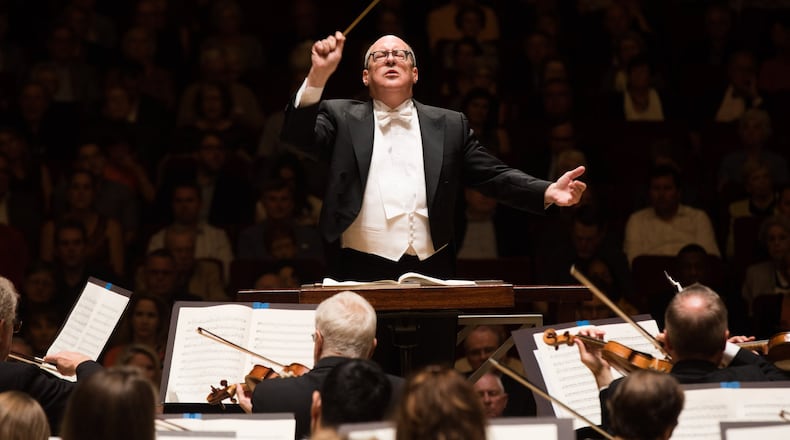Robert Spano announced Tuesday that he will conclude his tenure as music director of the Atlanta Symphony Orchestra after the 2020-2021 season.
At that point, Spano will have led the orchestra for two decades — a long time for any director of a major orchestra. He will stay on as “conductor laureate,” and continue to lead the orchestra on a regular basis, but his main energies will be redirected to something new.
What that new venture will be, he hasn’t determined, he said Monday. “It’s kind of wonderful,” he added. “I mean, it’s exciting to think of all the possibilities and not know what’s going to happen yet. But I’ve got three years to figure it out.”
The ASO's executive director, Jennifer Barlament, called Spano "one of the most significant voices in the orchestral world. In addition, his sense of humanity, humility and generosity make him an inspiring collaborator. His impact on this institution and this city cannot be overstated and will continue for generations to come."
Spano has led the orchestra during a period of growth, with nine performances at Carnegie Hall over the past 17 years and six Grammy awards among the ASO's 20 recordings under his baton.
One of the director's signal achievements is the championing of new music, which he stated as part of his mission upon his arrival in 2001.
Part of that mission was winning over Atlanta's supposedly conservative audience. "I know what to do," he told Pulitzer Prize-winning composer Jennifer Higdon, according to an account in the online publication NPR Music. "I'll be convincing on the podium."
Spano and the ASO went on to perform and record works by Higdon and many others. According to the ASO, the orchestra has performed “28 ASO commissions; 13 ASO co-commissions; 49 world premieres and 32 Atlanta and U.S. premieres. In 2016, in recognition of Spano’s significant commitment to contemporary composers, he was awarded the American Composers Forum’s Champion of New Music Award.”
Spano built trust with his audience and gained acceptance for the music of living composers — including those from his Atlanta School of Composers (such as Higdon) — by choosing music that stressed tonality and melody, and by satisfying the demand for music from the classical canon.
“I have this reputation of being Mr. New Music,” he told AJC writer Pierre Ruhe in 2000, “but in the diet of my musical life, there’s a lot of Beethoven and Tchaikovsky and Brahms and all those other known quantities.”
Spano has been at the helm during turbulent times. In 2014, after years of deficits, the ASO administration insisted on reducing the orchestra's size to cut costs, and the musicians balked, and were locked out for nine weeks, delaying the start of the season.
To address the shortfall, the orchestra launched the Musicians' Endowment Campaign, co-chaired by Spano, which raised more than $27 million to fund 11 additional orchestral positions in perpetuity. The orchestra has finished the past three seasons with a financial surplus.
As music director for two decades, Spano comes close to the longevity of the ASO's Robert Shaw, who directed the orchestra from 1967 to 1988.
Deciding when to leave is tricky, Spano said. One wants to exit while the music is still playing.
“I came knowing I wanted to stay a long time, and I vowed that I would not stay too long,” said Spano, 56. “But how do you know? You don’t, I guess. But this is an attempt to do that.”
Spano and the ASO board began discussing his departure last fall, during negotiations for the renewal of his contract. He was 40 when he arrived in Atlanta and will be 60 when he leaves the role of music director.
The ASO will soon begin a search for a new musical director to take over in 2021. Spano has vowed not to meddle with that process.
What he leaves behind, he said, is the “joy of working with an orchestra that you know so well. There’s nothing like that. It’s an incredible artistic reward to have such a deep understanding of an orchestra that only comes with time. That’s hard to say goodbye to. On the other hand, we all need to take on fresh challenges, and institutions need fresh blood.”
About the Author
Keep Reading
The Latest
Featured




